Fifa: Sepp Blatter & Michel Platini banned - is this the tipping point?
- Published
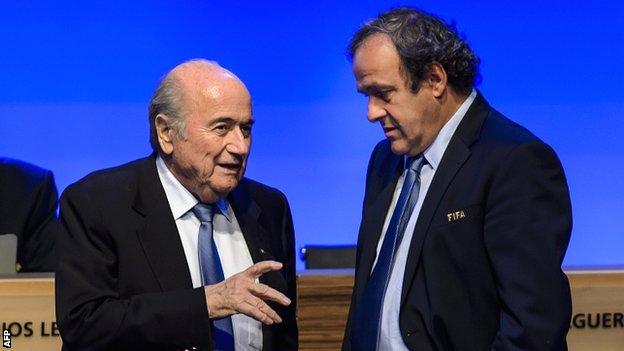
Sepp Blatter and Michel Platini have both appealed against their respective bans from Fifa
Kicked out of the game he had ruled for so long, Sepp Blatter's departure from Fifa along with that of the next most powerful man in the sport - likely successor and Uefa chief Michel Platini - seemed like a defining moment.
After so many years of corruption, and with so many of those at the top of the sport disgraced, banned or under investigation, a void now exists at the top of world football.
And yet, because we have become so conditioned, so numb, to the years of scandal, deceit and theft, instinct prevents us from assuming anything. What appears truly momentous turns out to be merely incremental.
So could this be the moment, once and for all, that things actually change? A tipping point? Or yet another false dawn?
Little wonder that some are cautious.
For most people, watching events from afar, Blatter left office five months ago, when he announced he would be stepping down.
Dan Roan reports from Zurich on Fifa president Sepp Blatter's resignation
I remember the now-familiar dash to Zurich that June evening, the world's media descending on Fifa HQ to herald a fresh start, a new era. The recovery - it appeared - would now begin.
But Blatter stayed, clinging grimly on. Even with Swiss criminal proceedings opened against him, Fifa sponsors demanding he disappear, and now with him finally banished from office altogether, the 79-year-old refuses to give up or admit defeat.
He has appealed, claimed his innocence, insisted he was not afforded due process, and could even return to office a few days before February's presidential election having served his suspension. An election which, with most of the leading candidates now banned, could yet be postponed.
Since June, a battle of wills has been raging between those who believe world football's governing body should be given the benefit of the doubt and allowed the chance to self-regulate, and the critics, who insist that, even if a reformist such as Prince Ali of Jordan becomes president, the governing body simply cannot be trusted long-term. They say it has proved itself not fit for purpose, and must be told what to do.
Never has the latter argument felt quite so compelling. Because football's administrators, it seems, will never learn.
More on Fifa's corruption crisis | |
|---|---|
Let us consider the case of Platini.
A man who, having suggested he would vote for the US as 2022 World Cup hosts, then admitted he supported Qatar, a decision that forced football into an unprecedented rescheduling of the event, causing havoc for the European clubs and leagues he was meant to represent.
A man whose son went to head up a Qatari sports kit company shortly afterwards - although Platini says that had nothing to do with how he voted.
A man who is being treated as "between a witness and a suspect" by the Swiss criminal authorities over a "disloyal payment" he received from Blatter shortly before he voted for him to stay as president in 2011.
A man who asks us to believe the reason for a nine-year delay in that payment was because Fifa could not afford to pay him the money, despite the organisation enjoying multi-million pound profits at the time (although he has yet to produce any paperwork to back up his defence).
A man who is now suspended from all football activity, along with the man he used to advise - Blatter.
Platini has vowed to clear his name, and denies any wrongdoing.
But after all of that, and given how obviously football is crying out for a fresh start, one might have expected him to have withdrawn his candidacy to become Fifa president. To do what some would regard as the honourable thing in the wider interests of the game.
Instead, the former France international raged against the disciplinary process, condemning the allegations as "astonishingly vague", and submitted his candidacy papers anyway in a mood of "staunch defiance". In a bizarre statement, he hinted at being the victim of a conspiracy "to taint a lifelong devotee of the game", and described his suspension as "farcical".
Fifa needs to start again - Lineker
Farcical? What is really farcical, perhaps, is Platini's inability to appreciate that, regardless of his innocence or otherwise, merely by association he is tainted whether he likes it or not.
What is also farcical, arguably, is the Football Association's refusal to withdraw their support for the beleaguered Frenchman, a decision which former sports minister Hugh Robertson has urged the governing body to rethink quickly.
All this, let us remember, at a time when IOC president Thomas Bach has called on Fifa to be open to an "external presidential candidate of high integrity" to lead football forward into a new era.
This weekend, journalists were directed by Platini's advisers towards the support he retains from Conmebol. Four of the South American confederation's former senior officials are among nine Fifa personnel indicted on corruption charges by US prosecutors. Maybe Platini should think twice before shouting about that support.
One senior member of the Government told me this weekend that they were bemused by the FA's loyalty to Platini, and FA chairman Greg Dyke will be asked to explain himself to MPs in two weeks' time when he appears before the Culture, Media and Sport Select Committee in Parliament. He will be asked why the FA backed the Uefa president before he had even issued a manifesto, and before waiting to see which other candidates may be running.
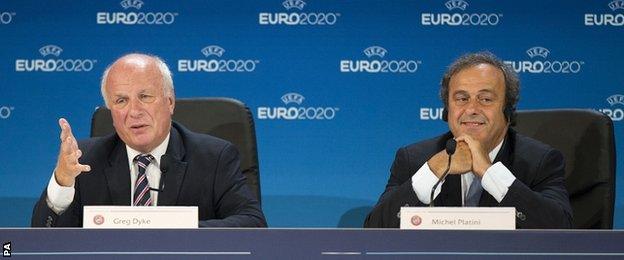
Greg Dyke has said that the FA are still backing Michel Platini as Fifa president but says there are issues that need to be "fully examined".
The FA have their reasons for backing Platini - as outlined in a previous blog - and obviously they could not have foreseen his suspension when declaring their support.
But they leave themselves open to suggestions they have lost the moral high-ground that Dyke fought hard to win in Sao Paulo last year - when he led a European rebellion against Blatter - and by FA vice-chairman David Gill in May, when he refused to take his seat on the Fifa Exco in protest at the president's latest re-election.
On Thursday, Uefa will hold an emergency meeting in Nyon to discuss whether an alternative candidate to Platini should be considered, and whether to push for a postponement of the Fifa presidential election.
Such a move could give Platini more time to clear his name, but could risk giving Blatter a chance to launch an audacious bid to stay in power - assuming Swiss criminal prosecutors do not charge him with any wrongdoing before then.
In the meantime, while football's politicians try to work out how on earth to plot a path through this mess, the rest of us are left to consider what should happen to Fifa.
What is certain is that Blatter's departure does not in any way suggest the job is done. The fact that Issa Hayatou, a man reprimanded in 2011 by the IOC over bribery allegations - which he denies - is now acting president, proves that.
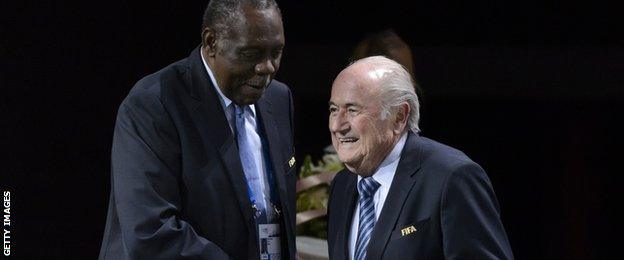
Issa Hayatou (left) is Fifa's stand-in man at the top
In a bid to police itself, the organisation currently has two reform programmes being worked on - by its audit and compliance chief Domenico Scala, and Swiss lawyer Francois Carrard, respectively - but many believe Fifa has lost the right to police itself, and demand an entirely independent reform commission.
Various suggestions deserve consideration:
An amendment to the statutes so that outsiders can be considered for the role of president, not just those involved in football.
A separation of powers - as proposed by academic Stefan Szymanski - splitting Fifa's commercial operations (including the marketing and broadcast rights to the World Cup) from its charitable arm (dedicated to developing the game globally), so that politicians are no longer in charge of awarding contracts or selling rights. The commercial entity could even be floated on the stock market, making the body accountable to shareholders.
A much more significant role to be played by international players' union FIFPro, a global footballing body with 50 years of experience of dealing with clubs, leagues, national associations, to draw upon.
Some want to go much further, urging the Swiss government - recently emboldened by new laws designed to clampdown on the many international sports bodies based there - to put Fifa into state control, seize its assets, wind it up and start again.
Others, such as the International Centre for Sport Security, have suggested the establishment of a global body dedicated to good governance and integrity - the equivalent to the World Anti-Doping Agency - overseeing a neutral regulatory platform or code that all sports governing bodies are accountable to.
Some may naturally ask where the money for such a concept would come from, but given the vast fortunes the sports industry now generates, surely it cannot be impossible.
What seems certain is that this is Fifa's ground zero, and a chance to rebuild that must not be squandered.
- Published11 October 2015
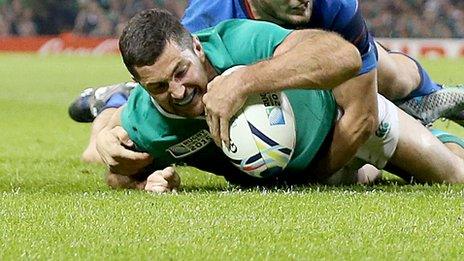
- Published11 October 2015
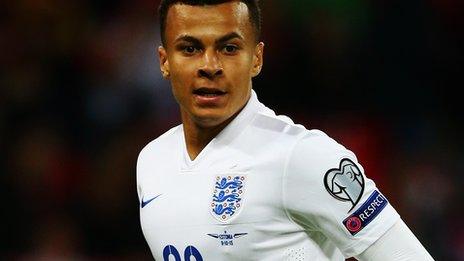
- Published11 October 2015
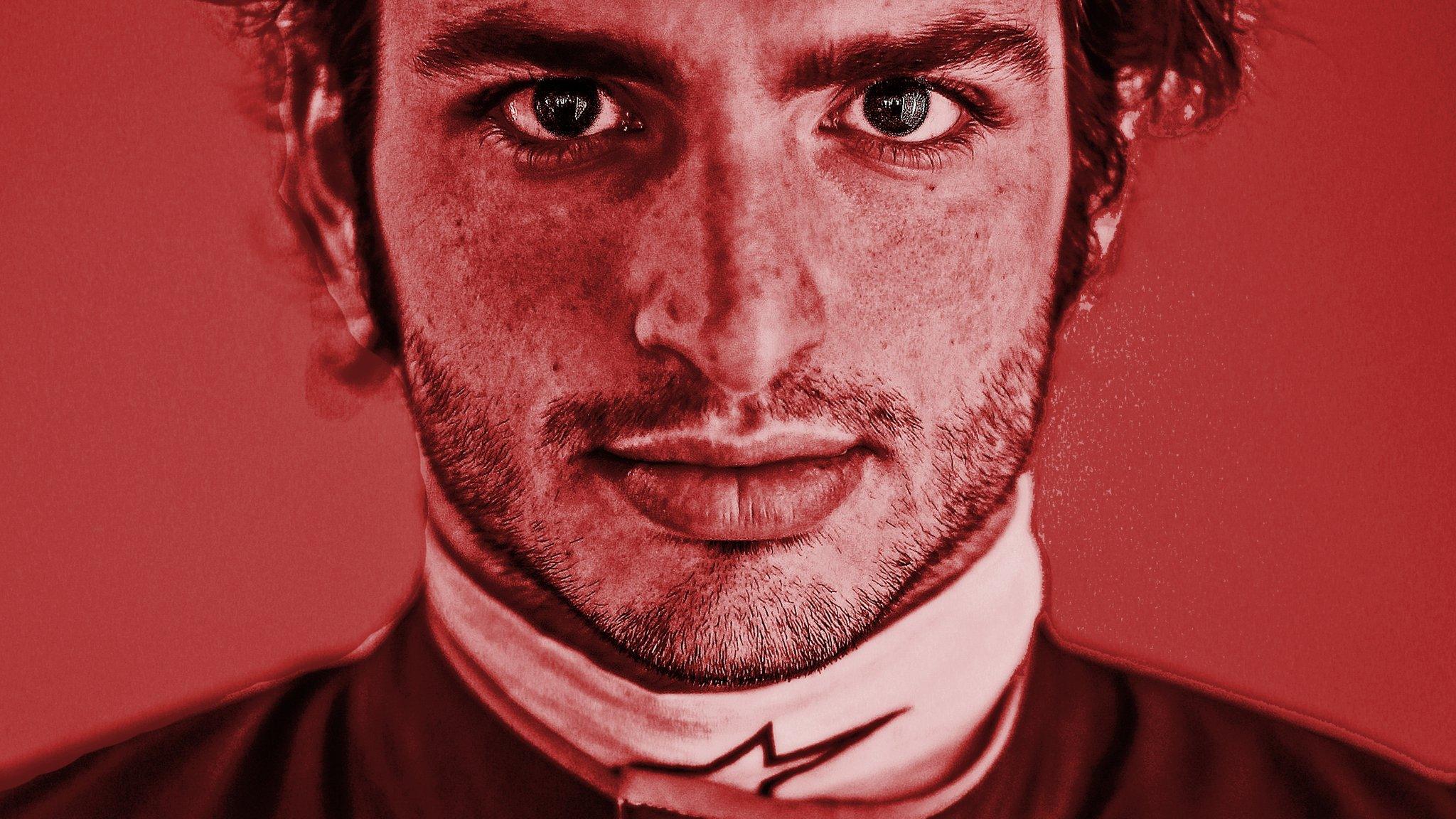
- Published11 October 2015
- Published20 June 2016

- Published2 November 2018
